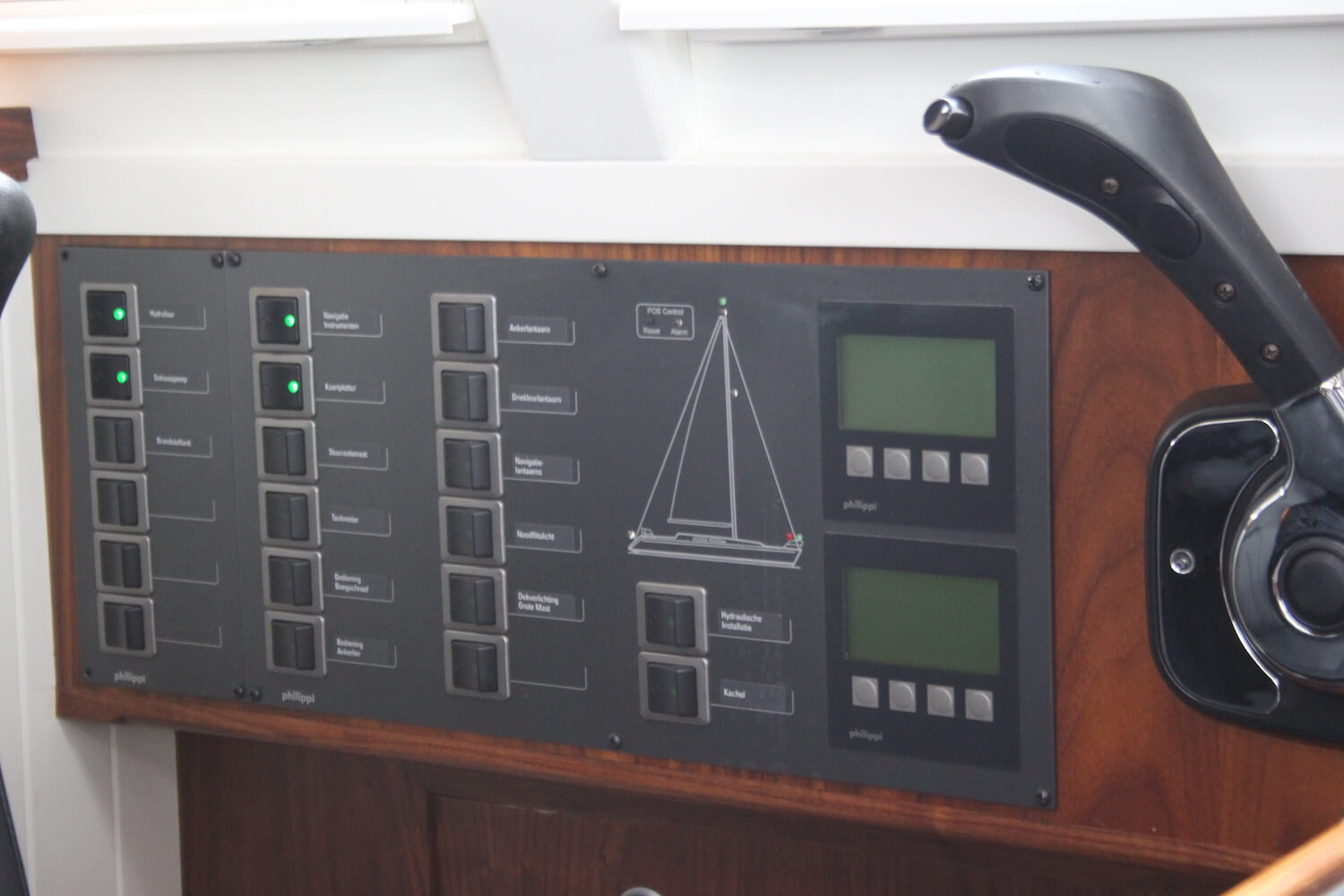10 Crucial Checks When Buying a Private Seller's Boat
If you're buying a boat from a private seller, there are a few things you should check. Without a broker, no one is there to get disclosures or ask questions for you. This article will give you a some critical things to look into when you try to make that deal.
In theory, buying a boat from a private seller does not differ from buying one listed with a broker. In practice, a private seller may not know that problems should be disclosed, or how a survey and inspection works. This opens up a few risks, since there are no standard procedures, disclosures, forms and contracts in a private sale.
How can you avoid making a mistake and buying a boat with serious problems? To start, here are 10 Crucial Checks When Buying a Private Seller's Boat to get you headed in the right direction.
These checks won't tell you everything that's wrong, but they will give you some things to look for and ask the seller about, and help you know if the boat is worth the price.

10 things you should check before buying a boat from a private seller:
Check for Liens
Brokers check for liens on a boat as part of the regular due diligence. While it's rarely a problem on smaller, private transactions, a boat can have loans, mechanic’s liens, unpaid yard bills, and other debts attached to it. There's not a consistent way to look these up, so you will have to do some legwork.
Brokers have access to databases to check liens. You can access some of these - for a fee - but they don't always turn up every debt. A few methods to check for problems include:
Check your Hull ID instantly at Boat Alert History Reports
Just enter your HIN and get a comprehensive report including:
- claims and liens
- accidents & pollution incidents
- theft check USA & Canada
- and much more - For a full list of report checks, go to Boat Alert History Reports.
- Web sites such as https://marineliens.com and https://marinetitle.com may have lien information.
- The USCG National Documentation Center may have information on liens and titles of USCG documented vessels and will provide an abstract of title.
- Most U.S. states will have title information on boats. Lien information will vary from state to state and by country, so check your locale.
- Talk to the yard where the vessel is stored or berthed. Make sure storage and service bills are current, and all balances will be paid before closing. Check right before closing to be sure. The boatyard may have heard about problems the seller had with contractors.
- Ask the seller. Be polite, since it can be a touchy topic. But if the seller talks about problems with contractors, it’s a tip you may want to find out more.
A formal mechanics lien or loan against the boat will require the lien to be settled at closing, before title is transferred. Yard and storage debts may not be recorded as liens, but a yard will refuse to launch a boat with outstanding bills no matter who owns it. Many locales have rules that allow yards to sell boats with unpaid debts, so you want to be very careful. Boat loans must be paid off before the bank will transfer the title to you.

Look for Wet and Damp Spots
Since boats live in water, things will be wet. But the boat must keep the water out of where it doesn't belong. Water inside the boat can be from something as innocuous as leaving the companionway open in the rain, but it can also be a sign of something more serious. Leaks from deck hardware can penetrate and soak a cored deck, or water could seep in and rust things you can't see.
-
Stains. Keep an eye out for staining, particularly around windows, head liners, and visible backing connections for deck and hull fittings. Weeping or leaking often leaves discoloration even if nothing is rusting. Also look for staining on cushions, curtains and mattresses.
-
Bubbling and separation. Some leaks get behind wood and vinyl surfaces and can cause delamination of the glues that hold on headliners and trim. Raised bubbles in vinyl or loose veneers sometimes show evidence of leaking and water intrusion.
-
Puddles. The most obvious check - which I hope you wouldn't miss - is standing water. It has to come in somewhere. Found out where.
If you see any of these tell-tales, ask the seller about it and explore it further. Find out about known leaks, when they happen, and what he has done to fix them.
Check for Odors and Smells
A well found sailboat won't have permanent strong and offensive odors. And you don't want to live with them. But even the best kept boats sometimes develop smells. When they do, it's a sign that something needs correction. There are a few smells you want to keep your nose looking for as you inspect a boat.
- Mold and Mildew. Mildew is easy to get and hard to get out. A pervasive smell may show a serious problem than has only gotten a surface cleaning. Put your face close to upholstery and conditions and take a sniff if you have concerns.
- Septic odors. Unpleasant head smells are a common problem with boat plumbing. They can be a sign of saturated hoses in an older boat, of leaks or bad seals in tanks and hose fittings, or blocked tank vents. These are fixable problems, but a big septic leak into the boat is hard to clean up.
- Burned smells and smoke. In particular around the engine and electrical systems, a faint smell of smoke may tip you off about short circuits, sparking, or electrical problems.
- Rotten eggs and bilge smells. Checked out bilge odors, because most water coming into the boat ends up in the bilge. Under normal conditions, you should not smell the bilge when it is closed. It may have an odor if you stick your head down there, but it shouldn't permeate the boat. Standing bilge water will develop a strong smell if not emptied.
- Garbage and food odors. These may be a sign of a poorly kept boat with food left in storage or the refrigerator. While unpleasant, it's not as much of a tipoff as some of the other smells.
NOTE: I once had a rotten-egg smell coming from my batteries - but only while charging. They needed replacement; though the odor was distinctive, it was impossible to smell an hour after charging finished.
In an ideal world, a boat shouldn't smell, or should smell fresh. Any smart seller will run a dehumidifier for a day before a showing, or leave the boat open to air out. Either or both will leave a clean, fresh smelling boat if all is good.
Feel for Soft Spots

As you walk the deck, step slowly and carefully while feeling for flexing and movement in the deck. This may be a sign of delamination in the deck. Whether it is cored or not, this can cause problems. It's not an insurmountable flaw, but it should be noted and discussed.
Knocking on the deck and hull in places can also find voids and delamination. A surveyor will often do this with a small plastic mallet, however the seller may object if you whip out a hammer and start pounding on the boat during a showing. But a few discrete knocks with your knuckle if you have any doubts about an area of the deck or hull can be informative.
We can fix boats with delamination, they can even be sailed for a time. But the repair process can be expensive and time consuming. If you plan to do it, your final offer should take this into consideration.
Note that small boats like dinghies aren't designed for the point loading of an adult standing on them and may flex despite not having delamination issues.
Check the Engine - Oil, and Smoke
If you can, get the seller to run the engine. It should start easily, and it shouldn't make any odd noises. Most engines aren't quiet, but unusual banging and clanking or rough running and idling should catch your attention.
Most engines will smoke a little when cold, and if you're looking at a boat in cool weather, it's easy to mistake steam from hot exhaust for white smoke. A little white smoke at starting is fine, but if an engine smokes under load, or gives off heavy smoke that doesn't go away it bears checking out. Black smoke can be caused by something as simple as overloading the engine while accelerating or excessive growth on the prop. But it can signal larger problems.
Also check around the engine for oil stains. Some are normal - changing the oil on a boat can be a messy process and spilling isn't unusual. Look for dripping oil or stains in places away from the dipstick and filter for potential problems.
Move the Through Hulls

They make very few boats these days with gate valves on through-hulls, as they are unsuited for use on a boat. These are valves with screw-handles like you might find on a hose outlet at home. If the boat has these, they will need to be replaced.
Through hulls should open and close, have the original handles, and not be encrusted with corrosion. They also should have with proper backing plates instead of attached straight to the hull. Any which do not meet these criteria should be replaced, and that should factor into the purchase price.
Inspect the Wiring
Boat wiring can be a horror. The American Yacht and Boating Council has very exacting standards for wire sizing, color schemes, connection standards, labeling, and a variety of other rules designed to make sure wiring is safe and easy to maintain. If an ABYC certified electrician wired the boat with explicit instructions to follow all the codes, you'll have a pleasant surprise.
Because that rarely happens.
Many boat builders wire with the colors they have on hand rather than what the codes call for. And worse, many do-it-yourself boat owners do their own wiring and installation without paying close attention to basic standards for safety.
Some red flags in the wiring include:
- Using wiring nuts to connect wires.
- Soldered or crimped connections without heat-shrink protection. Crimped connections are preferred over solder.
- Undersized wires.
- Improper fusing.
It's tough to check all these things in a quick glance, but you may spot something easy like the wire nuts or poor connections that prompts you to look closer and ask questions.
Inspect the Standing Rigging

Ask the seller how old the standing rigging is if it's a boat older than ten years. Standing rigging doesn't last forever and needs to be replaced every ten or fifteen years, especially if you intend to insure it.
Inspect turnbuckles and fittings for signs of rust and make sure all connections are sound. If you have concerns, a professional rigger can inspect it to make sure it is safe.
OWNER'S TIP: The first season you own the boat, drop the mast and inspect it for rust and wear. Hire a rigger if you have to. Periodic rig inspections and maintenance will save you problems and may avert a critical failure.
The rig is a tricky thing to check out before a survey, since most sellers won't want you climbing the rig during a boat showing! However, you can check all the rig fittings at deck level since they are most likely to be in the best state of maintenance. You can do it during the survey; discuss the plan with your surveyor.
Look Over the Electrical Systems

A broker showing a boat rarely has the owner on board to answer questions or operate things for you. In a private deal you can and should ask as much as you can of the seller and have him show you what works and what does not.
Have him turn everything on when you see the boat. Flip on every light, turn on every pump, run the water, turn the refrigeration on, and flush the toilets if they are electrical. Start the engine, run the blower, turn the running lights and deck lights on, blow the horn and turn on the radio and get a radio check.
And if he's hesitant to flip switches for you, there may be a reason.
Read the Full Survey

If you've read any of my other boat buying articles here in Improve Sailing, you already know I am a big fan of pre-purchase surveys on any boat with an engine or complex systems. To follow this tip, you will need to get a survey and sea trial done. Believe me, it's worth it.
But if you don't read the whole survey and take action from it, you've wasted your money. While a survey is, at its core, a "thumbs up" (or down) on the boat, a good professional survey will contain a wealth of other information about the boat.
The surveyor will perform the checks in this list and many more, but will do them in more detail than you can during a showing with no contract on the boat. That little hammer may be used to tap out the entire deck and hull for delamination, not just a few spots that you suspect. Every system will be checked and catalogued, an most systems will get tested and any problems or suspicions noted.
Most surveys include a sea trial, where the engine will be run up to speed and tested. If you view the boat on the hard, you can't even start the engine, but the sea trial and survey gives a chance to take it and put it through its paces.
Your survey will have several key takeaways you need to read and understand.
- The detailed inventory of systems and descriptions of what is really there. I've referred to surveys years after purchase to find information.
- Problems found and non-functional systems.
- Recommended actions to bring the boat in compliance with governing safety standards and best practices.
- An approximate market value for the boat.
All of this tells you in advance what to expect in your first year of ownership. You can use this information to negotiate a final price if you find problems, or reject the boat if it turns out it wasn't in the shape you expected.
TIP: The problem list from your survey is most of your first-year work list!
And beware - if you insist on a professional survey and a private seller refuses to allow one, walk away from the boat. Even if you decide not to do a survey, there is no legitimate reason for a seller to not allow one on any boat. Just asking for one can teach you volumes about the actual condition of the boat.
Did you find the answer to your specific question?
👍 4 👎 0
Comments
Michael McHugh
Do you have to be able to swim?
Leave a comment